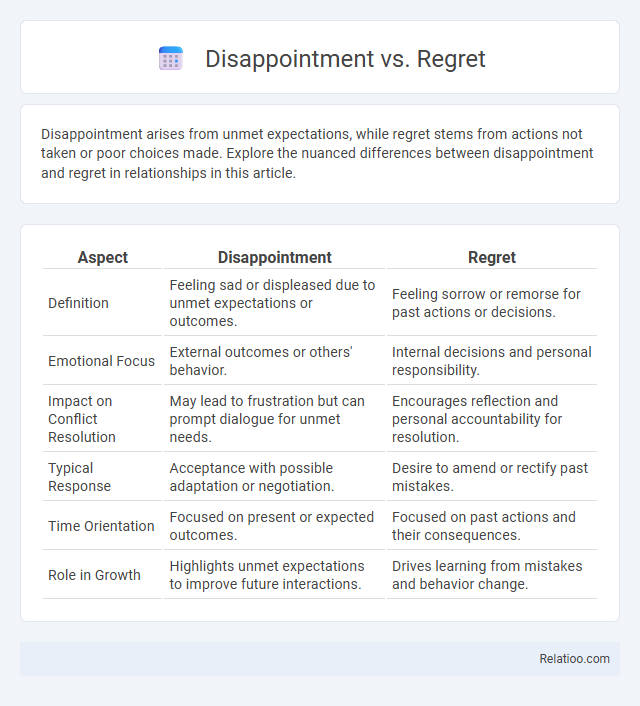Disappointment arises from unmet expectations, while regret stems from actions not taken or poor choices made. Explore the nuanced differences between disappointment and regret in relationships in this article.
Table of Comparison
| Aspect | Disappointment | Regret |
|---|---|---|
| Definition | Feeling sad or displeased due to unmet expectations or outcomes. | Feeling sorrow or remorse for past actions or decisions. |
| Emotional Focus | External outcomes or others' behavior. | Internal decisions and personal responsibility. |
| Impact on Conflict Resolution | May lead to frustration but can prompt dialogue for unmet needs. | Encourages reflection and personal accountability for resolution. |
| Typical Response | Acceptance with possible adaptation or negotiation. | Desire to amend or rectify past mistakes. |
| Time Orientation | Focused on present or expected outcomes. | Focused on past actions and their consequences. |
| Role in Growth | Highlights unmet expectations to improve future interactions. | Drives learning from mistakes and behavior change. |
Understanding Disappointment and Regret
Disappointment occurs when your expectations are unmet, creating a feeling of dissatisfaction with current outcomes, while regret involves reflecting on past decisions and wishing you had chosen differently. Understanding disappointment helps you manage emotions tied to unforeseen results, whereas recognizing regret allows you to learn and grow from previous mistakes. Both emotions are crucial in personal development, guiding better decision-making and emotional resilience.
Key Differences Between Disappointment and Regret
Disappointment arises when outcomes fail to meet expectations, reflecting dissatisfaction with external events, while regret involves a personal sense of responsibility for choices that led to undesired results. Disappointment is often tied to uncontrollable circumstances, whereas regret focuses on internal decision-making and the possibility of having acted differently. Understanding this distinction clarifies emotional responses and guides more effective coping strategies.
The Emotional Impact of Disappointment
Disappointment triggers a temporary emotional response marked by sadness and frustration when expectations are unmet, often leading to missed opportunities for growth. Unlike regret, which involves reflecting on past decisions with a sense of responsibility, disappointment centers on external outcomes rather than personal choices. The emotional impact of disappointment can result in decreased motivation and lowered self-esteem, making it crucial to develop resilience strategies for emotional recovery.
How Regret Shapes Decision-Making
Regret influences decision-making by prompting individuals to anticipate future feelings about their choices, leading to more careful evaluation of potential outcomes. Unlike disappointment, which arises from unmet expectations after an event, regret involves a self-focused reflection on past decisions and their perceived negative consequences. Understanding regret helps in developing strategies to minimize future negative emotions through more deliberate and informed decision processes.
Common Triggers for Disappointment
Common triggers for disappointment often include unmet expectations, broken promises, and failure to achieve personal goals, which can cause a profound sense of dissatisfaction. You might experience disappointment when events or people do not align with your hopes, leading to emotional distress distinct from regret, which centers on choices made. Understanding these triggers allows for better emotional management and resilience in coping with life's challenges.
The Role of Hindsight in Regret
Regret is uniquely shaped by hindsight, as it involves reflecting on past decisions with the knowledge of their outcomes, often leading you to wish for different choices. Disappointment arises from unmet expectations or outcomes, typically without the deep reflective element tied to imagined alternatives found in regret. Understanding how hindsight influences regret helps differentiate it from disappointment, highlighting the cognitive process of evaluating past actions through the lens of what could have been.
Coping Strategies for Disappointment
Effective coping strategies for disappointment include acknowledging emotions without self-judgment, practicing mindfulness to stay present, and reframing negative thoughts to foster resilience. Engaging in problem-solving approaches helps transform setbacks into actionable steps, while seeking social support provides emotional validation and perspective. Regularly setting realistic expectations minimizes the intensity of future disappointments and strengthens emotional regulation over time.
Overcoming Regret: Practical Steps
Overcoming regret involves acknowledging past decisions without dwelling on them, which distinguishes it from the emotional sadness found in disappointment. Practical steps include reframing negative thoughts, setting achievable future goals, and practicing self-compassion to build resilience. Cognitive behavioral techniques and mindfulness can significantly reduce persistent regret by promoting emotional acceptance and forward-focused action.
Psychological Effects of Unresolved Disappointment and Regret
Unresolved disappointment often leads to persistent negative emotions such as sadness and frustration, impairing emotional well-being and increasing vulnerability to anxiety and depression. Regret tends to trigger rumination over past decisions, intensifying feelings of guilt and self-blame, which can hinder personal growth and decision-making confidence. Both unresolved disappointment and regret disrupt cognitive processing and emotional regulation, contributing to chronic stress and diminished overall mental health.
Turning Disappointment and Regret Into Growth
Disappointment and regret both stem from unmet expectations but differ in focus; disappointment centers on present feelings about outcomes, while regret involves reflecting on past decisions. Turning these emotions into growth requires proactive self-reflection, learning from mistakes, and adopting a growth mindset to foster resilience and future improvement. Techniques such as cognitive reframing, goal adjustment, and mindfulness help transform negative emotions into valuable insights for personal development.

Infographic: Disappointment vs Regret
 relatioo.com
relatioo.com